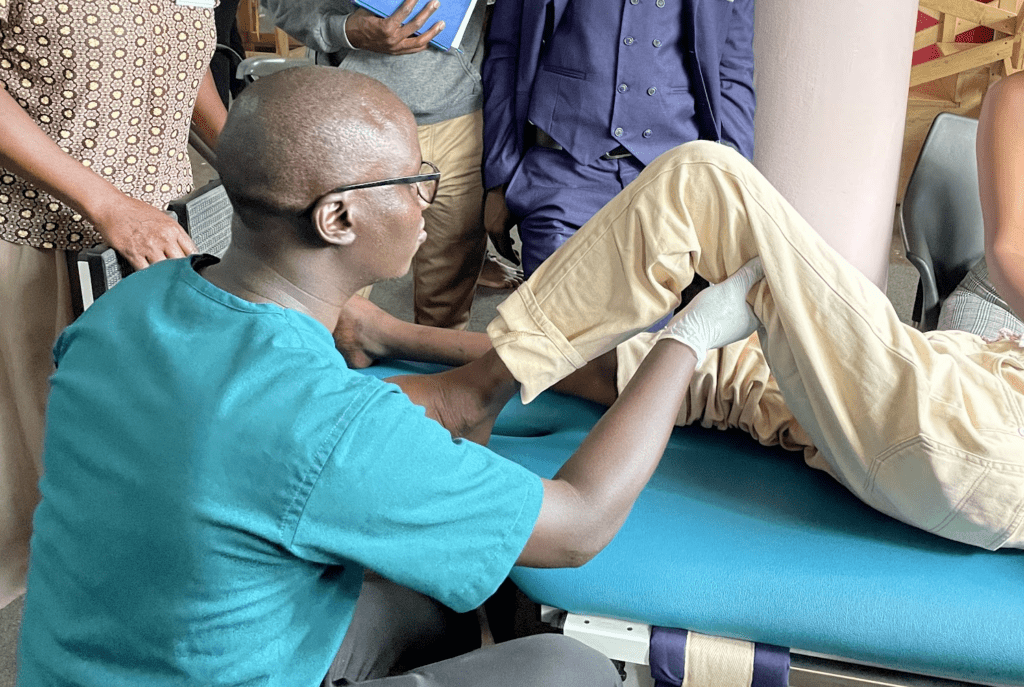
“One cannot change what one cannot measure. It’s our very basic and logical thinking that we need to remind ourselves of in every rehabilitation session.” – Course participant
___________________________________________________
Rehabilitation, as defined by the World Health Organization (WHO), helps individuals achieve optimal functioning. It involves various interventions and techniques addressing impairments, limitations, and restrictions, considering personal and environmental factors. Accurate measurement and monitoring are crucial for selecting appropriate rehabilitation interventions, and confidence in fundamental rehabilitation assessment techniques is essential for efficient care.
In September 2023, Learning, Acting, and Building for Rehabilitation in Health Systems (ReLAB-HS), led by Physiopedia, offered a massive open online course (MOOC), “Understanding Basic Rehabilitation Techniques Programme.” This four-week program, delivered on the Plus eLearning platform, consisted of eight courses, two live webinars with topic experts, and an optional final assignment. It aimed to equip rehabilitation professionals with knowledge of fundamental rehabilitation techniques for delivering effective care. The course outlined principles guiding the selection of rehabilitation techniques, enabling rehabilitation and health professionals to play an effective and proactive role in efforts to increase access to high-quality rehabilitation and improve health outcomes.
__________________________________________________
“This course is excellent! Personally, it provided a big review of basic rehabilitation techniques for me and more importantly it has reinforced my determination to incorporate the concept of [International Classification of Functioning, Disability, and Health] in the course of my practice in patient care.” – Course participant
__________________________________________________
Building a skilled rehabilitation workforce is one of the key areas that underpins scaling up rehabilitation as a health priority as part of the Rehabilitation 2030 initiative. With less than 10 skilled practitioners per 1 million people in many low- and middle-income countries (LMICs), improving access to rehabilitation-related education is a priority. With support from the United States Agency for International Development (USAID), ReLAB-HS has delivered rehabilitation training to nearly 1,350 people through the 11th annual Physiopedia MOOC (the course remains available for people to do in their own time).
MOOCs are freely available courses, are delivered online, and have the potential to engage a large number of learners from different countries at any one time. They provide an accessible, affordable, and flexible way to learn new skills, advance careers, and deliver quality education experiences at scale. This course reached a very wide and varied demographic. In total, 103 countries were represented, with a fairly even split between high- and low-income settings, and included representation from 26 different health care professions across multiple workplace contexts (i.e., the government, private sector, academia, nongovernmental organizations, etc.). The gender distribution was nearly 2:1 women to men, and the majority were in the 25-34 age range.
There was a high (63%-100%) completion rate for each course included in the program, with a statistically significant improvement in knowledge reported. The highest completion rates were observed among participants from LMICs. Overall, the MOOC provided new knowledge of basic rehabilitation skills to novices and a deeper review for more advanced practitioners. One participant highlighted that it was “an excellent course for basic levels and fantastic revision for advanced levels!” with another stating that the course “supplied virtually every piece of information needed for assessment techniques in rehabilitation!” Many participants were grateful to update their knowledge of rehabilitation and expressed enthusiasm for the extensive detail that the MOOC went into, which encouraged reflection on current practice and the opportunity to improve the provision of care.
______________________________________________
“It’s a great pleasure for me to be part of this program. I have significantly improved my knowledge and skills which can guide me to effective service delivery to my patients.” – Course participant
______________________________________________
Accessible and affordable online courses continue to provide an effective method to improve rehabilitation knowledge, skills, and services globally. With USAID support, ReLAB-HS will continue to develop online courses related to rehabilitation to improve the knowledge and skills of health care professionals worldwide in an effort to contribute to building a skilled rehabilitation workforce to meet the need for rehabilitation services.